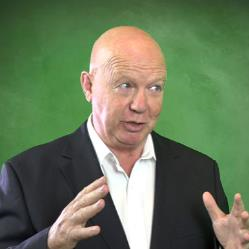 "Why is it vital that we develop a more customer aligned mindset?" - interview by John Smibert.
"Why is it vital that we develop a more customer aligned mindset?" - interview by John Smibert.
 In previous discussions with Ian J Lowe he has claimed salespeople can change the world by truly putting the customer at the centre of why we sell. Ian suggested that for many it requires a substantial change in mindset. So I asked him if he could explain the importance of changing our mindset and how we can do it. This is one of a number of interviews with Ian that I will publish on this subject.
In previous discussions with Ian J Lowe he has claimed salespeople can change the world by truly putting the customer at the centre of why we sell. Ian suggested that for many it requires a substantial change in mindset. So I asked him if he could explain the importance of changing our mindset and how we can do it. This is one of a number of interviews with Ian that I will publish on this subject.
In this specific discussion Ian Lowe tells us that we have three brains and in order to engage effectively with the customer we must first have congruency between the three. For a while I wondered what he was smoking.
He told me that there are millions of neurons in our heart and our gut - so each in effect are brains. And these neurons communicate up to the head brain - not the other way around. So a gut reaction is the gut brain communicating to the head brain. In the same way our feelings are communicated to our head from our heart brain. Ian goes on to explain such communication is a result of something we sense and is called a reactant. He give some examples of reactants to which we can all relate.
What has this got to do with selling? Well, imagine you are meeting with a client - their heart brain, the gut brain and the head brain are all working together, giving the person a sense of the interaction that we're having. And if they get a gut sense - or they get a feeling in their heart - that something's not quite right here, "there's some sort of disconnect between what you're saying or doing and how I'm feeling," that's going to have a negative impact.
So that is why your intent towards your customer has to be 100% pristine as a deep commitment. As Ian says; "We really have to examine our motives and our intent, and really understand what it is we're doing, what it is we're all about, what it is we're trying to achieve" to ensure the customers reactants are positive.
And yes, we need to have congruence between our three brains if we are to engage effectively with our customer and build trust.
Read or view the full interview below. If you are in a position of leadership this interview may provide good insight into how we might want to transform the way we sell as an organisation. I recommend it for CEO's, COO's HR, Sales leaders, as well as professional salespeople.
Ian is the CEO of Eccoh.co (formally Go-Givers Australia). He is an expert in sales transformation and a specialist in why people sell.
Interview
John: Welcome back, Ian!
Ian: Hi, John!
John: We've got Ian Lowe with us, and Ian's really got me thinking about how salespeople can change the world. We've had a couple of discussions about how we can change our mindset, or the fact that we need to change our mindset, and what I'd really like to talk, Ian, more about - and maybe we can do this over two or three discussions - how we can change our mindset.
Ian: Sure, yes.
John: I know you talk a lot about neuroscience, and how we can... Tell me more about that. Because I've just heard you say we got three brains.
Ian: Yes!
John: That's strange, that's weird!
Ian: [laughs] It's funny, isn't it? When we think about mindset, we often think about our mind, our brain. But I've spent a bit of time recently with a lady called Sylvia Damiano of the About my Brain Institute, a highly valued partner of ours, and I've learnt so much about the brain. And when I say the brain, I'm talking about three brains. We have our head brain, but we also have our heart brain and our gut brain.
John: This is sounding a little bit weird. Is that real?
Ian: [laughs] That's real. When you think about neurons, we have about 100 million neurons in our stomachs.

John: So when people say "I've got a gut feel." that's really valid.
Ian: That's a real thing, right? And the interesting thing is that the way the brain and the gut communicates is not the brain communicating down to the gut brain, it's the other way around; it's the gut telling the brain.
John: So, when I, as a salesperson I walk through the door to a customer, and start talking... A customer will talk about first impressions, the customer actually gets a gut feel for who I am, and whether I'm going to be of any value to them.
Ian: Yes - absolutely, yes. And also, when you think about how they feel, we're talking about the heart brain as well. So, the heart and the gut, there's about 17 million neurons in the heart as well. The heart brain, the gut brain and the head brain are all working together, giving the person a sense of the interaction that we're having. And if they get a gut feel or they get a sense in their heart that something's not quite right here, there's some sort of disconnect between what you're saying and how I'm feeling, that's going to have a negative impact.
John: It really makes me think about a lot of the selling I've been involved with in the past and people I've worked with that use different methods to sell; some of them are quite aggressive methods or manipulative methods. I've always thought, ~I might be wrong~, but I always thought customers see through them in no time at all.
Ian: Absolutely they do. There's this reaction to that sort of selling, it's called reactance. ~Let me try this for~ you, John. When you see a sign that says "Wet paint - don't touch."
John: [laughs] I want to touch it! Maybe it was painted about eight hours ago and it'd be dry by now - let me find out!
Ian: See, that's reactance.
John: Yes.
Ian: Reactance is triggered, or we induce reactance, when we feel that our ability to freely choose has been reduced.
John: Right.
Ian: So, when people sell like that, when they try and close the deal, they're trying to apply pressure to get the client to move along the sales cycle, you're inducing reactance, and the client's feeling "I don't like that." and then they're going to back away from making their decision.
John: So, in a very scientific way now you're reaffirming what I always thought was the case anyway.
Ian: Yes.
John: Okay, now I understand. So, we have three brains, and that's going to be reacting in different ways inside the client, to be able to resist that sort of behaviour.
Ian: Yes.
John: So, that really means as individuals we've got to be pretty good at being genuine, authentic, and really understanding that client and being on that client's side, rather than trying to manipulate them.
Ian: Yes. And also we've got to understand what does that mean, for us to be congruent right through the brain, through the heart, through the gut.
John: Us, as well as them.
Ian: Yes. How will we ensure we got alignment and congruence between what it is we're saying, what is we're feeling and what it is we're doing? Because if there's any disconnect along that route... And a lot of the time sales training deals with the head, right? Intellectually we can understand this, but are we really consistent and congruent? Are we dealing with the heart and the gut as well?
John: This is a fascinating subject.
Ian: It is fascinating, yes.
John: And we need to come back and talk about it more. So, the bottom line for the discussion we've just had is what?
Ian: We really have to examine our motives and our intent, and really understand what it is we're doing, what it is we're all about, what it is we're trying to achieve.
John: Okay. Let's get together again, and talk about how, as salespeople and organisations, we can actually look at our mindset, look at our intent, so that we are portraying the way we need to, to engage properly with our customers.
Ian: I'd love to do that, John!
John: Okay - look forward to it!
Ian: Brilliant!
John: Thanks, Ian!
****************
More short interviews with Ian Lowe:
***************

Your Invitation: I invite you to join the Sales Leader Forum group on LinkedIn where you can experience informative discussions with your peers and sales thought leaders on subjects like the one we have discussed here. I also invite you to subscribe to the
- Sales Leader Resource Centre here
- Sales Leader YouTube channel here (300+ sales leadership videos)
Please Share: If you valued this article, please share via your Twitter, LinkedIn, Google+ and Facebook social media platforms. I encourage you to join the conversation or ask questions. So feel free to add a comment on this post - I promise to respond. If inclined please follow my LinkedIn post page here.
Want to touch base? If you have questions please feel free to contact me - email: john.smibert(at)salesleaderforums.com, Phone: +61 404857893 or Skype: john.smibert